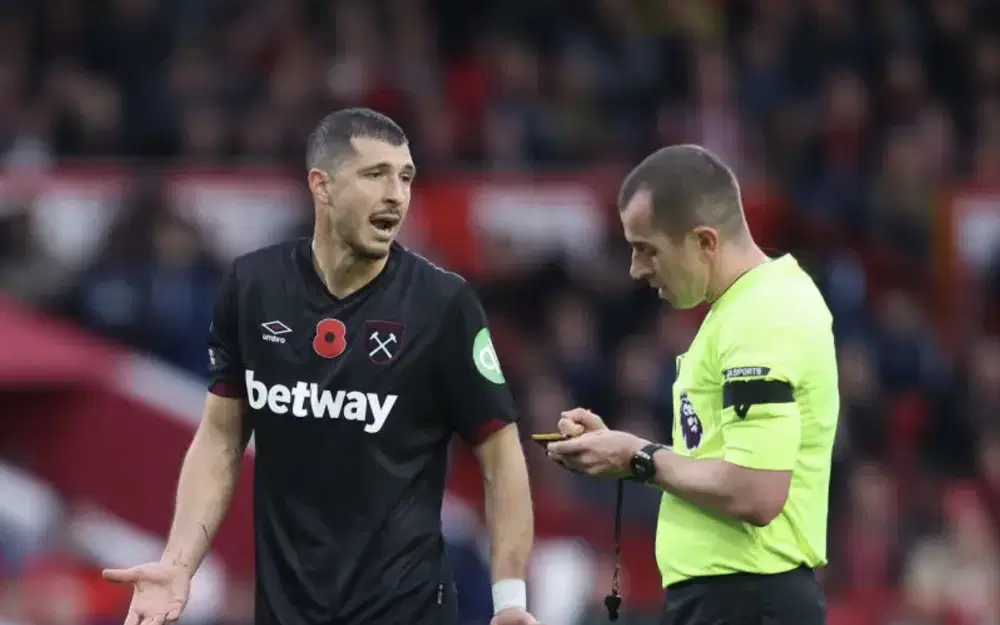VAR Turns a Blind Eye to West Ham’s Brutal Double Red Incidents!
West Ham United’s recent match was a showcase of how discipline issues can spiral out of control, nearly turning a frustrating game into a complete disaster. Despite Edson Alvarez being sent off with a second yellow card just before halftime for a reckless lunge — an all-too-familiar lapse in judgment — the Hammers were fortunate not to end the game with only eight players. Remarkably, the on-field referee missed two incidents that could have easily resulted in straight red cards, exposing a glaring lack of control that could have worsened West Ham’s already challenging position.
The Video Assistant Referee (VAR) system, which has been designed to assist officials in precisely these situations, seemed to have another day off, much to the frustration of West Ham fans and observers. While VAR is intended to catch and address potentially dangerous incidents missed by referees, this time, it seemed oddly silent on not one, but possibly two red-card-worthy fouls. This oversight contributed to an escalating sense of disorder on the field as West Ham struggled to maintain composure.
One such incident involved Crysencio Summerville, who appeared to lash out at Ryan Yates in what looked like a deliberate act of frustration. Observers noted that Summerville seemed to kick out at Yates’ head, which echoed the type of aggression seen in Mohammed Kudus’ infamous slap in the match against Tottenham Hotspur earlier this season. The lack of a VAR review was perplexing, especially when similar actions have previously led to immediate disciplinary action. For instance, in a match between Wolves and Luton last season, Wolves’ Jean-Ricner Bellegarde received a straight red card for a similar act of aggression, kicking Tom Lockyer in the groin. With such precedents in mind, it’s baffling that neither the on-field officials nor VAR saw fit to investigate Summerville’s actions.
Adding to the disciplinary woes, Guido Rodriguez was handed a yellow card for a heavy, late, and studs-up tackle in the 18th minute that had all the hallmarks of an “old-school” challenge — one that, on another day, might have easily warranted a red card. The lack of a VAR review here as well raised eyebrows, especially since players have seen red for less serious offenses. The cumulative effect of these incidents painted a picture of a team increasingly losing its composure, a reflection of deeper issues in both discipline and emotional control.
This meltdown on the field wasn’t limited to isolated moments but seemed to reflect a pervasive frustration across the West Ham squad. Players appeared unable to channel their frustration constructively, often resorting to reckless challenges and tempers that could easily have left their team even more shorthanded. It’s the kind of breakdown in discipline that often signals issues within the team’s overall mentality and possibly points to a lack of direction from the coaching staff. Leadership, or the lack thereof, often plays a critical role in managing these high-tension situations, and West Ham’s poor showing suggests that this might be an area needing urgent attention.
As things stand, West Ham were somewhat lucky to escape the match without further dismissals, though that shouldn’t mask the glaring warning signs. The missed red cards and lack of VAR intervention might have spared them from a worse outcome, but the need for a significant improvement in discipline is clear. If this lack of control continues, West Ham could find themselves facing further consequences, both in terms of suspensions and potentially damaging results.
This episode raises serious questions about the consistency and effectiveness of VAR in the Premier League as well, especially in a league where officials have been tasked with upholding player safety and fair play standards. In West Ham’s case, the team’s failure to keep its cool, combined with what some would consider leniency from both the on-field referees and VAR, might have temporarily helped them avoid an even harsher outcome, but it remains a concerning trend that could have costly repercussions if not urgently addressed.



